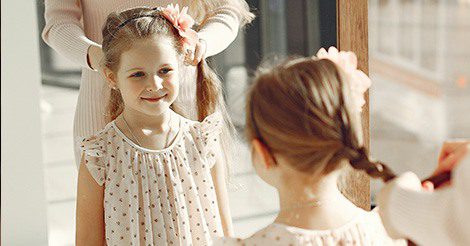Positive Self-Image
A child’s social-emotional development is as important as his or her cognitive and physical development. Children are not born with these skills; rather, they take direct instruction and support to develop. Self-image is one of the most important factors that affects a child’s behaviors. It’s also cyclical, meaning that a child behaves in a way that reinforces their self-image. A child with a positive self-image will interpret a bad situation in a way that protects himself, while a person with a negative self-image can internalize the same situation as his fault. Children with poor self-image quickly develop a defeatist attitude in the classroom and at home. Conversely, children with positive self-image are happier, more optimistic, demonstrate greater self-control, and are more willing to approach new tasks and try new things!
Believe it or not, you make the biggest difference in your child’s self-image. Your actions, the words you choose, and the body language you exhibit send a strong message to your child. It will tell her if you believe in her, trust her, enjoy her company, or respect her emotions. So make sure you regularly use words, actions, and non-verbal cues that show your belief in your child’s inherent value and abilities.
Age-appropriate Adaptations:
- Two-year-olds—Read books that promote a positive self-image, such as I Like Me! by Nancy Carlson or I’m Gonna Like Me: Letting Off a Little Self-Esteem by Jamie Lee Curtis. Share some of the things you love most about your child. Then, ask your child to repeat the affirmations. For example, if you said that you love how funny your child is, ask him to say “Mommy and Daddy love how funny I am. I am funny.”
- Three-year-olds—Encourage your child to draw a self-portrait. As she draws, ask her what she likes about herself or what makes her feel special or good about herself. Write down what she shares on index cards. Hang her self-portrait and the personal affirmations around her room. Regularly remind her of her personal affirmations, especially at times when she is feeling sad or upset.
- Four-/Five-year-olds—Talk with your child about how everyone makes mistakes from time to time and that’s okay. Mistakes don’t define who we are; mistakes help us learn and grow. Consider reading a book about characters that make mistakes, such as The Girl Who Never Made Mistakes by Mark Pett, Beautiful Oops! by Barney Saltzberg, or The Most Magnificent Thing by Ashley Spires.
Skills Supported: self-image/self-esteem, confidence, fine motor skills (drawing)

